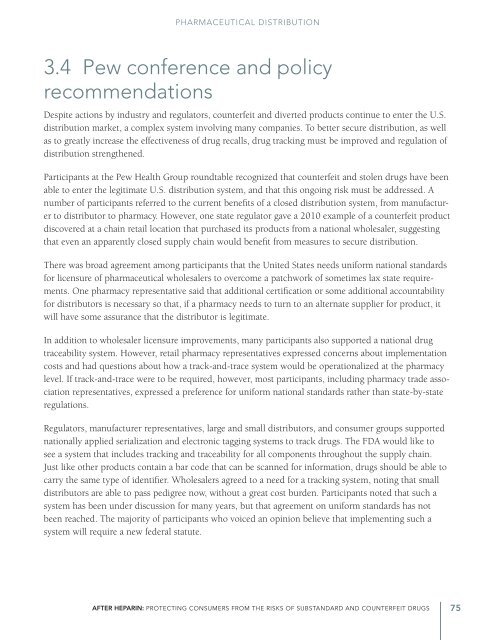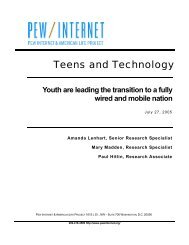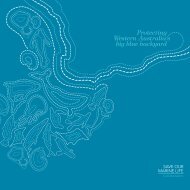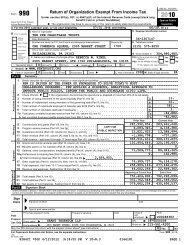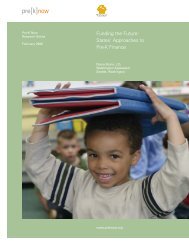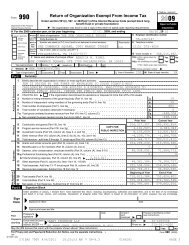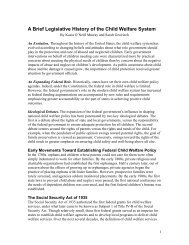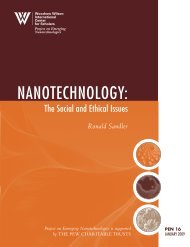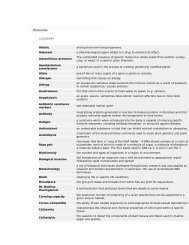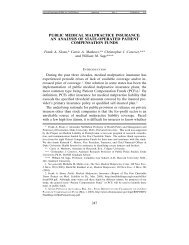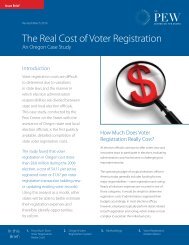After Heparin: - The Pew Charitable Trusts
After Heparin: - The Pew Charitable Trusts
After Heparin: - The Pew Charitable Trusts
You also want an ePaper? Increase the reach of your titles
YUMPU automatically turns print PDFs into web optimized ePapers that Google loves.
PHARMACEUTICAL DISTRIBUTION<br />
3.4 <strong>Pew</strong> conference and policy<br />
recommendations<br />
Despite actions by industry and regulators, counterfeit and diverted products continue to enter the U.S.<br />
distribution market, a complex system involving many companies. To better secure distribution, as well<br />
as to greatly increase the effectiveness of drug recalls, drug tracking must be improved and regulation of<br />
distribution strengthened.<br />
Participants at the <strong>Pew</strong> Health Group roundtable recognized that counterfeit and stolen drugs have been<br />
able to enter the legitimate U.S. distribution system, and that this ongoing risk must be addressed. A<br />
number of participants referred to the current benefits of a closed distribution system, from manufacturer<br />
to distributor to pharmacy. However, one state regulator gave a 2010 example of a counterfeit product<br />
discovered at a chain retail location that purchased its products from a national wholesaler, suggesting<br />
that even an apparently closed supply chain would benefit from measures to secure distribution.<br />
<strong>The</strong>re was broad agreement among participants that the United States needs uniform national standards<br />
for licensure of pharmaceutical wholesalers to overcome a patchwork of sometimes lax state requirements.<br />
One pharmacy representative said that additional certification or some additional accountability<br />
for distributors is necessary so that, if a pharmacy needs to turn to an alternate supplier for product, it<br />
will have some assurance that the distributor is legitimate.<br />
In addition to wholesaler licensure improvements, many participants also supported a national drug<br />
traceability system. However, retail pharmacy representatives expressed concerns about implementation<br />
costs and had questions about how a track-and-trace system would be operationalized at the pharmacy<br />
level. If track-and-trace were to be required, however, most participants, including pharmacy trade association<br />
representatives, expressed a preference for uniform national standards rather than state-by-state<br />
regulations.<br />
Regulators, manufacturer representatives, large and small distributors, and consumer groups supported<br />
nationally applied serialization and electronic tagging systems to track drugs. <strong>The</strong> FDA would like to<br />
see a system that includes tracking and traceability for all components throughout the supply chain.<br />
Just like other products contain a bar code that can be scanned for information, drugs should be able to<br />
carry the same type of identifier. Wholesalers agreed to a need for a tracking system, noting that small<br />
distributors are able to pass pedigree now, without a great cost burden. Participants noted that such a<br />
system has been under discussion for many years, but that agreement on uniform standards has not<br />
been reached. <strong>The</strong> majority of participants who voiced an opinion believe that implementing such a<br />
system will require a new federal statute.<br />
<strong>After</strong> <strong>Heparin</strong>: PRotecting Consumers from the Risks of Substandard and Counterfeit Drugs 75


